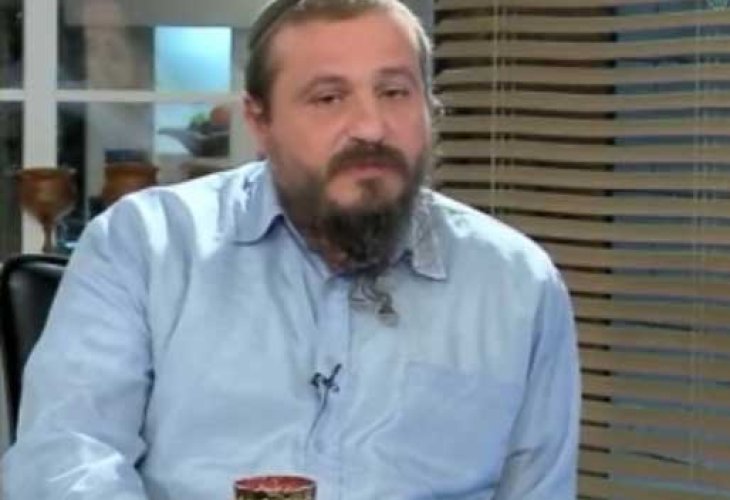Personal Stories
From Headlines to Heart: Uri Ravach’s Journey to Truth and Torah
Once a well-known journalist chasing fame, Uri Ravach now shares how Torah helped him rebuild his values, his relationships and his life
- Dudu Cohen and Hofit Naaman
- |Updated

This week, Uri Ravach appears on the program In Another Direction on Hidabroot Channel 97. For much of his life, Uri was a journalist through and through, writing from a young age for school newspapers, Ma’ariv for Youth, Army Radio, and later Channel 2 News. He laughs now, admitting that Arik Einstein’s song My Little Journalist described him perfectly.
But behind the scenes, there was a different story unfolding. Uri says openly that his conscience didn’t guide him in those days. He chased sensational stories sometimes filled with gossip or even slander and didn’t stop to consider who he might hurt in the process.
Over time, though, something shifted. A deep emptiness began to creep in. Slowly, that emptiness led him to explore Judaism. He began wearing a kippah, studying the laws of lashon hara (negative speech), and eventually left Channel 2. He spent a year as a communications advisor to the Minister of Religious Affairs, and ten years ago, he moved to Channel 1. There, he even turned his personal office into a mini synagogue, bringing in a Torah scroll, praying daily, and focusing his reporting on stories of Jewish life and values. He showed his colleagues and himself that it is possible to work in media while staying true to halachah (Jewish law).
Uri grew up in a poor neighborhood in Be’er Sheva, raised by his mother after losing his father at the age of 14. “It wasn’t easy,” he shares. “But my mother gave me everything she could. Growing up in tough conditions shaped my sense of justice. I always wanted to fight for the underdog, to correct wrongs, to expose corruption. But in the Channel 2 newsroom, everything was about mood and ratings. After every news broadcast, there was a meeting called the ‘post-mortem’, an analysis of what went well or poorly. People lived for the attention they got that night. When your sense of worth depends on feedback, it’s not real.”
That sounds like a very hard way to live.
“Exactly. A person who lives for fame and career alone is a miserable person. No question.”
Did you have any red lines back then?
“They used to tell me, ‘You don’t have Hashem.’ And they were right. I didn’t think about people. If I had my eyes on a story, I went after it without thinking twice. Of course, everything was done ‘professionally,’ but there was no heart.”
Later in the interview, Uri speaks openly about how his growing observance of Torah led him to apologize to people he had wronged, people he hurt in his reporting. One of them was former Israeli President Ezer Weizman. “I traveled to meet him, together with my wife. I told him, ‘I may have been a good journalist, but I wasn’t a good person.’ I asked for his forgiveness. Baruch Hashem (thank G-d), we were able to make peace.”
You work today at Channel 1. Even though it’s a public station, they also want ratings. What happens when they assign you a story that doesn’t fit your values?
“I tell them straight out. I won’t run a story that’s going to harm someone unfairly. If the story serves the public good, and it’s a mitzvah to report it, I’ll do it. But to get ratings by blackening someone’s name? I try very hard to avoid that. One of the news editors once warned me, ‘Don’t preach.’ I told him, ‘I’m not preaching, just letting things slowly sink .’”
Uri’s path back to Judaism started with a conversation with a young man from Chabad who had also gone off the path somewhat. “He told me about the love and warmth in the community. That caught my attention.” Not long after, Uri became close to Rabbi Dov Bigon, the head of Machon Meir, a religious Zionist yeshivah. “He’s a wonderful man. He even officiated our wedding.”
At the same time, Uri left Channel 2 and worked for a year and a half with Minister Asher Ohana. That’s also when he met his wife. Today, they’re blessed with six children. Still, something was missing.
What gave you real spiritual life?
“I started learning Tanya and Chassidut, the deeper parts of Torah. And I realized something important: Every person has gifts that they’re meant to share. If you don’t use your strengths for good, it’s like you’re living in a cage. It doesn’t matter if you’re Sephardi, Ashkenazi, Litvish, or Chassidish, we each have a unique path and a mission.”
Uri eventually returned to journalism but this time with deep fear and care. “I didn’t sleep for many nights,” he admits. “It’s a powerful tool, the media. But now I try to use it with responsibility.”
Uri Ravach’s story is a reminder that it’s never too late to change, to return, to ask forgiveness, and to rediscover who we are meant to be. He may still be reporting the news but now, his life speaks volumes.

